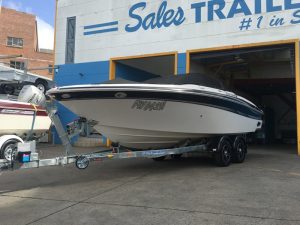Boat trailer maintenance Part 1
Blog | September 23rd, 2019In our two part boat trailer maintenance article we will cover the following important areas to making sure your your boat trailer is maintained for maximum performance for year to come.
We will cover tyres, bearings, brakes, suspension and more.
Your trailers is an important part of your trailer + boat set up, yet they often it’s neglected until something fails.
Trailers break down for all sorts of reasons, but more often than not the culprits are flat tyres, poorly maintained brakes and corrosion. A trailer problem is at the very least extremely inconvenient, as it can immobilise your boat, and at worst life-threatening, if something goes wrong while you’re towing at speed on the freeway.
It always pays to have an emergency backup like a Roadside Assistance for boat trailers and tow vehicles.
The best way to not get stranded, of course, is to prevent problems from occurring in the first place — and the best way to go about that is with simple and routine trailer maintenance. Here are some tips to get you started.

22ft boat trailer Sales Trailers
Do you have the right trailer
It may sound obvious, but it’s vital to have the appropriate trailer for your boat. Yes, the trailer is not the source of on-water enjoyment — it’s merely a means to an end — but while the temptation may be to get the smallest and cheapest, second-hand trailer imaginable, it may not be worth the risk. A non-compliant trailer (i.e. one that’s illegal) is a danger to you, your boat and other drivers, and the authorities will take a dim view if you’re towing a boat on one and are involved in an accident.
Thankfully, the rules on trailer compliance, braking requirements and loads are pretty clear.
Always wash down to prevent corrosion
Salt water is inherently corrosive — and corrosion is fatal to steel trailers. Or rather, it will be, if you don’t wash down after every outing.
On steel trailers, rust has a nasty tendency to appear in inaccessible spaces. Regular checks of all components will flag problems before they spread so make a point of regularly inspecting your trailer, paying close attention to bolts, joins and welds. Any sign of cracking should be immediately addressed. Similarly, all rearward components (the end that gets dipped in the water) should be closely scrutinised.
If possible, have the trailer on a jack so you can look underneath. Don’t forget to look inside and around all components like brakes and calipers.
Aluminium trailers are significantly more resistant to corrosion than traditional steel trailers. However, they still require maintenance, and pay close attention for possible cracking.
Rollers and runners can stick or degrade due to salt and sand. Again, always give them a good rinse and replace if excessive wear is visible. If wear is more prominent on one side, then the rollers may need adjusting.
Check the tyres
Tyre problems are one of the most common causes of trailer breakdowns, so make a habit of checking your tyres before heading out.
Tell-tale signs include worn or irregular tread, deformed sidewalls or bulging. Cracking may be a symptom of dry rot. Look out for tyre abnormalities if the trailer has emerged from sitting idle during winter. Occasionally moving it over this period helps.
Check air pressure and inflate as per the manufacturer’s recommendations. Make sure that tyre rims are in good order too, as a deformed rim could in some cases lead to a blowout.
Check wheel bearings
Maintaining and replacing wheel bearings can add years to a trailer’s life. And yet, lack of maintenance is one of most common causes of trailer failure.
Trailer wheel bearings should be checked at least once a year (and ideally more often). Remove the bearings and thoroughly inspect them for wear. If there is heat damage, this will show as a blue tinge.
If you have any doubt, remove and replace the bearings. Otherwise, clean them so that they’re free of dirt and water, re-pack with grease and re-seal. Once everything is re-assembled, turn the wheels and look for ‘unnatural’ movement and listen for any noise. The wheel should turn without squeaking, while rocking and wobbling implies that the bearing may need tightening. While you’re at it, give the axle shaft(s) a good going over with grease.
Read part two of our boat trailer maintenance article here.
If you need your boat trailer serviced or repaired Sales Trailers on (02) 9533 3652
